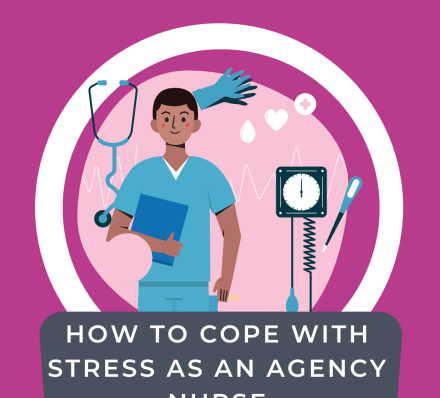Stress is part of life as an agency nurse and knowing how to manage nurse stress and burnout is vital not only for your own wellbeing but also for that of your patients.
What Is Nurse Stress and Burnout?
Everyone’s stress response is different, so understanding how you respond to stress at work is the first step. You might experience both physical and mental or emotional responses. Physical responses can include a rapid heart rate, teeth grinding, jaw clenching, nail-biting, or aches and pains. Mental and emotional responses you might not immediately recognise as stress can include poor concentration, irritability and low self-esteem. Burnout is commonly associated with professions that involve high levels of responsibility, emotional demands, and long hours, such as nursing, and other high-stress occupations.
Identifying that you’re experiencing nurse stress and burnout doesn’t mean you’re doing badly or not coping—it’s simply the first step to solving the problem. There are two important areas you can focus on to reduce your stress:
Lifestyle Management
-
Look at your work-life balance. This can be difficult in nursing, but it’s important to keep an eye on how much downtime you’re getting away from work.
-
Relax and recharge. Make sure you’re using at least some of your rest time to recuperate, not filling it with more tasks.
-
Don’t repeat self-destructive behaviours. Relying on caffeine, alcohol or bad eating habits to cope with stress will make you more stressed in the long term.
-
Build a support network. If you’re feeling under pressure, talk to a friend, family member or colleague. There are lots of resources and spaces in the agency nursing community where you can seek support.
-
Take care of your body and mind through gentle exercise, meditation or whatever works best for you. Make sure to follow Vetro on social media, as we run FREE online mediation workshops and currently for the month of April are sharing Osk yoga & wellbeing's FREE on-demand Yoga Nidra.
Mindset
-
Be aware of unhealthy thinking patterns. Nurse stress can cause low moods and poor self-esteem, which can easily spiral into vicious circles of unhealthy and destructive behaviour.
-
Be realistic with yourself. Don’t expect yourself to become a paragon of mental health overnight, but set small manageable goals towards improving your mindset.
-
Know what you can and can’t control. Look at where you can change things you do have control over, and how you can prepare for or respond to things outside your control.
-
Invest your energy wisely. Don’t sweat the small stuff—nobody’s emotional resources are infinite.
-
Keep a sense of proportion. In a high-pressure environment like nursing, stress can feel all-consuming. Think back to a time when you successfully overcame a stressful situation, and remind yourself that if you did it then, you can do it again.
Whether you’re an RGN, HCA or a District Nurse, our experts are here to advise you on the next step in your career. If you’re looking for a new agency nurse job, get in touch with Vetro today.
Check out why Julie Connick became a Vetro Nurse. Click here to watch.




